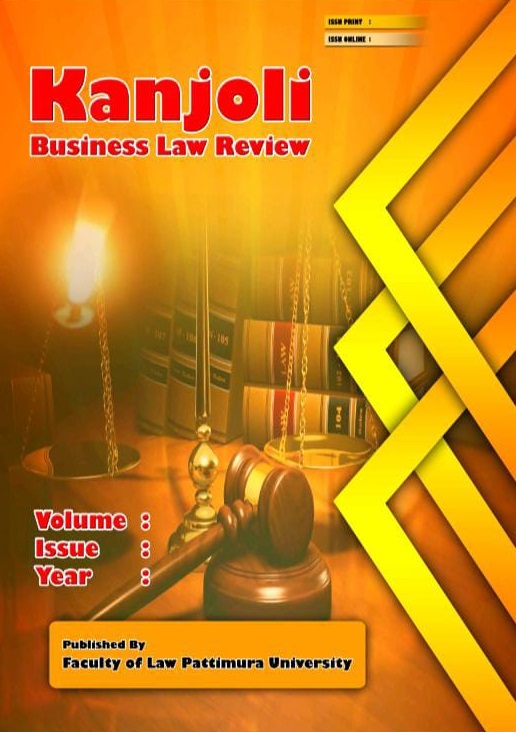Perlindungan Konsumen dan Tanggung Jawab Perusahaan Ekspedisi terhadap Kasus Kerugian Barang dalam Pengiriman
Abstract
This study discusses the responsibility of expedition companies towards lost consumer goods using a normative juridical research method. The results of the study indicate that regulations related to the shipment of goods by business actors are governed by several laws and ministerial decisions. However, there is often a gap between expedition practices and legal provisions, which leads consumers to feel dissatisfied or disadvantaged. Adequate consumer protection becomes crucial, and there is a need for revisions to the Consumer Protection Law to accommodate the interests of all parties involved. Dispute resolution between consumers and business actors can be carried out through non-litigation channels, such as the Consumer Dispute Settlement Body (BPSK), or through litigation channels. In cases of lost goods caused by expedition companies, these companies are fully responsible in accordance with the principle of liability for negligence. Therefore, expedition companies are obliged to compensate consumers for both material and non-material losses incurred.
Downloads
References
H. F, Asnawi. Transaksi Bisnis E-commerce: Perspekstif Islam. Yogyakarta: Magistra Insani Press, 2014.
Handriani, Aan. “Perlindungan Konsumen Dalam Perjanjian Transaksi Jual Beli Online.” Pamulang Law Review 3, no. 2 (2020): 127–38.
H.M.N, Purwosutjipto. Pengertian Pokok Hukum Dagang Indonesia, Hukum Pengangkutan. Jakarta: Djambatan, 2000.
Hudi Asrori S, H.M. Mengenal Hukum Pengangkutan Udara. Yogyakarta: Kreasi Wacana, 2010.
Juwitasari, Nina, Diah Sulistyani Ratna Sediati, Muhammad Junaidi, dan Soegianto Soegianto. “Perlindungan Konsumen Terhadap Pengguna Jasa Ekspedisi.” Jurnal Usm Law Review 4, no. 2 (2021): 688–701.
Kamal, Azam Faiz, dan Budi Widjajanto. “Text Mining Untuk Analisa Sentiment Ekspedisi Jasa Pengiriman Barang Menggunakan Metode Naive Bayes Pada Aplikasi J&T Express.” Semarang: Universitas Dian Nuswantoro, 2017. https://core.ac.uk/download/pdf/141659410.pdf.
Kamila, Meiliana, dan Imam Haryanto. “Tanggung Jawab Hukum Perusahaan Ekspedisi Atas Hilangnya Barang Konsumen.” Jurnal USM Law Review 5, no. 2 (2022): 832–49.
Miru, Ahmadi, dan Sutarman Yodo. Hukum Perlindungan Konsumen. Jakarta: Raja Grafindo Persada, 2014.
Muhammad, Abdukkadir. Hukum Pengangkutan Niaga. Bandung: PT Citra Aditya Bakti, 2021.
N, Mubarok. Buku Diktat Hukum Dagang. Surabaya: Fakultas Syariah dan Hukum Universitas Sunan Ampel, 2016.
Nugroho Handayani, Fajar, dan Ahmad Raihan Harahap. Hukum Perlindungan Konsumen. Yogyakarta: CV Bintang Surya Madani, 2021.
“Perlindungan Hukum Dan Tanggung Jawab Pelaku Usaha Atas Hilangnya Paket Dalam Jasa Layanan Pengiriman Barang Melalui Pt Jne Wilayah Tangerang | Jurnal Hukum Adigama.” Diakses 21 Mei 2024. https://journal.untar.ac.id/index.php/adigama/article/view/12036.
Prasetyo, Edy, Arief Budiono, dan Jan Alizea Sybelle. “Pertanggung Jawaban Hukum Pihak Ekspedisi Pengiriman Terhadap Barang Hilang atau Rusak.” Jurnal Penegakan Hukum dan Keadilan 5, no. 1 (2024): 29–43.
Rimanda, Rahmi. “Keberadaan Badan Penyelesaian Sengketa Konsumen (BPSK) Sebagai Lembaga Quasi Yudisial Di Indonesia.” Jurnal Bina Mulia Hukum 4, no. 1 (2019): 17–34.
Sadiki, Sarah E. “Tugas dan Wewenang Badan Penyelesaian Konsumen Berdasarkan Undang-Undang Nomor 8 Tahun 1999 Tentang Perlindungan Konsumen.” LEX PRIVATUM 5, no. 7 (2017). https://ejournal.unsrat.ac.id/index.php/lexprivatum/article/view/18237.
Sidharta. Hukum Perlindungan Konsumen. Jakarta: Grasindo, 2016.
Copyright (c) 2024 Harly Clifford Jonas Salmon (Author)

This work is licensed under a Creative Commons Attribution-NonCommercial 4.0 International License.
Authors who publish their manuscripts in this Journal agree to the following conditions:
- The copyright in each article belongs to the author, as well as the right to patent.
- Authors are able to enter into separate, additional contractual arrangements for the non-exclusive distribution of the journal's published version of the work (e.g., post it to an institutional repository or publish it in a book), with an acknowledgment of its initial publication in this journal.
- Authors are permitted and encouraged to post their work online (e.g., in institutional repositories or on their website) prior to and during the submission process, as it can lead to productive exchanges, as well as earlier and greater citation of published work.
- Authors have the right to self-archiving of the article (Author Self-Archiving Policy)











